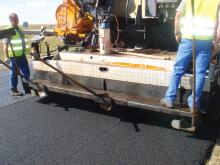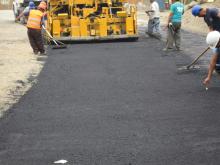Reducing vibrations on a bridge, supplying high-quality binders to emerging countries and helping small and medium players with warm mix, this month’s stories showcase some innovative bitumen technology solutions - Kristina Smith reports The Kessock Bridge in the Highlands of Scotland has become the third bridge in the UK to be resurfaced with Gussasphalt. A dense mastic asphalt containing Nynas Endura N5, a polymer modified binder, Gussasphalt has been designed to have a longer life than standard mastic as

A new Gussasphalt surface has been used on the Kessock Bridge as this material is expected to cope well with a challenging application
RSSReducing vibrations on a bridge, supplying high-quality binders to emerging countries and helping small and medium players with warm mix, this month’s stories showcase some innovative bitumen technology solutions - Kristina Smith reports
The Kessock Bridge in the Highlands of Scotland has become the third bridge in the UK to be resurfaced with Gussasphalt. A dense mastic asphalt containing294 Nynas Endura N5, a polymer modified binder, Gussasphalt has been designed to have a longer life than standard mastic asphalts.
One of the attractions of Gussaphalt for engineers when considering resurfacing options for the bridge was the smoothness that can be achieved. It is laid to a tight vertical tolerance using a special machine which runs on steel rails and it is laid continuously which means there are no transverse joints to create bumps and vibrations.
“The Kessock Bridge has a very lively deck,” said Dougie Millar, materials advisor at4068 Transport Scotland. “The mastic asphalt was sliding off the deck and moving. The bridge engineers felt that using Gussaphalt, because it is laid on rails, can reduce the vibration in the deck.”
As well as reducing the movement of the surfacing, lessening the deck’s vibrations should also cut down on noise due to the 30,000 vehicles that use the bridge daily. And it could reduce the number of repairs needed for the steel deck, going on ITS track record on previous projects.
Gussasphalt, developed and laid by Swiss company Aeschlimann International, has also been used on the Avonmouth Bridge near Bristol and the Tamar Bridge in south-west England. The2309 Highways Agency reported last year, three years on from laying Gussasphalt on the Avonmouth bridge, that it had been carrying out less welding interventions on the bridge’s steel box section structure.
The Kessock Bridge, which carries the A9 dual carriageway over the Beauly Firth at Inverness, is a cable-stayed bridge. Opened in 1982, it is a 1,052m-long continuous steel deck superstructure with a 240m main Span.
The original mastic asphalt surfacing had performed “pretty well”, said Millar, but after 30 years it had cracked and water was finding ITS way through to the steel deck, causing corrosion.1146 Balfour Beatty won the £13.25 million repairs and resurfacing contract from Transport Scotland, with the deck waterproofing and resurfacing subcontracted out to 2314 Stirling Lloyd.
After Balfour Beatty had removed the existing road surface and made any necessary repairs to the steel deck, Stirling Lloyd applied a primer followed by two layers of ITS Eliminator waterproofing -which they keyed to receive the Gussasphalt. It is important that all the layers bond together to create a composite structure.
Leiths Group supplied the Gussasphalt material for Aeschlimann to lay in two 25mm-thick layers. The Gussasphalt mix is tailored for each project to suit the different aggregates available, but includes crushed Stone, sands, limestone filler and additives including Trinidad Lake Asphalt granules. Surface texture comes from a 6mm bitumen coated aggregate which is embedded into the hot surface with a roller.
Kessock Bridge is being resurfaced in two phases to minimise disruption to holiday traffic during the summer. One carriageway was renewed between February and June 2013, with the second one scheduled for the same period next year. Balfour Beatty’s contract also requires the bridge’s cable stays to be retensioned which will happen during the second phase of works.
6446 DenimoTech, with sister company Bituminas, is planning a series of ‘Bituterminals’ in emerging markets around the world. With the first of these already being set up in Bolivia, the idea is that the Bituterminals will have all the equipment needed to transform bags of bitumen into any form of binder, including emulsion and polymer modified bitumens.
“We are scheduling five of these in the next five months,” said Denimotech CEO Anders Marschall Jensen. “A Bituterminal is a complete set up where the contractor can purchase any binder it might need in that market, on tap.”
Denimotech, which manufactures plants for making emulsion and polymer modified bitumens, joined forces with Bituminas in December 2013 through a merger and aquisition.
Denimotech Holdings is now in the unique position of supplying both the materials and the technology required for binders – “a completely vertical integrated bitumen company,” according to Bituminas CEO Bernd Schmidt .
The properties and quality of bitumens vary immensely, and this is likely to become more of an issue in coming years. By providing contractors with complete solutions, using its combined know-how of materials, plant and processes the Denimotech Group hopes to reduce risks for both contractors and funders by helping to create durable, longer-lasting roads.
“On top of the materials and products comes all the consulting services contractors will need to follow the right specification, whether British Standard or US,” said Jensen. “We can consult with them on the chemical side, on civil engineering and on road engineering.”
Central to the idea of Bituterminals is the reliability of the equipment being used. This is also an important requirement in the wider market, says Jensen.
Rationalisation in the industry means that there are fewer plants producing more products.
“Contractors are getting bigger and bigger, some refineries are shutting down; others are expanding," he said. “There is an increasing demand for binders but they have to be produced in one machine. They should be able to run continuously and reliably for 24-7 production.”
To that end, Denimotech has spent the last 18 months developing new colloid mill technology, aimed to deliver more flexibility and greater reliability in the production of its emulsion and polymer modified bitumen plants. The colloid mill is at the heart of any plant as it spins the bitumen and water or additives to create the binder.
The new DTM X-20 series boasts a number of improvements compared to its forerunners. The mill is longer which means that the main bearings which are often the first element to go, are further from the end where the hottest bitumen enters. “People tend to try different things with the bitumen. Some are going high on temperatures for different modifications and that can be hard on the bearings,” said Jensen.
In addition, Denimotech has improved the seals, switching from lip seals to mechanical seals. There is also an option to upgrade to double mechanical seals if very heavy duty production is required.
The teething grooves inside the mill have been hardened using a number of means including nanotechnology, which Jensen says makes them twice as hard as before. With an increasing number of ways to modify bitumen, including the addition of materials such as ground rubber and silicates, the teeth have to be tough.
A further improvement to the colloid mills, which come in DTM X-20 E series for emulsions and the DTM X-20 M series for polymer modified bitumens, is the addition of heat sensors to the mill head together with a PLC which can also provide other diagnostic information and early warnings on issues such as the state of the bearings.
“An experienced operator may be able to see things or feel things but with the addition of the diagnostics it gives us the possibility to better support our customers from a distance,” said Jensen. “It’s all about service and avoiding downtime.”
Finally, Denimotech has made it simple to adjust the mills to cope with different bitumens. This involves changing the distance between the rotor and the stator, an operation which previously required the mill to be taken apart but which can now be adjusted more easily.
“More and more bitumens are being traded across borders, so the properties of the bitumen you are using will vary,” said Jensen. “The option of being able to quickly change the gap, together with the speed, during production gives you a fast reaction to whatever your raw material is.”
For the first time, Denimotech will be supplying the mills, which are available in 12, 20 and 40tonnes/hour sizes, as standalone units rather than only as part of a full Denimotech plant. “We see the need for single mill heads on the market. There might be a plant where some of the other equipment is in good shape and they don’t want to change it all but they need a new mill head. “
Azalt ECO2 can be used at any mixing plant, without any modifications being required. And it also allows the asphalt producer to switch easily from hot mix to warm mix.
“This is a good solution for small and medium-sized companies who may not have the same technical resources as the major players,” said Vincent Baptiste, marketing and business development product engineer for Total bitumen. “We are getting good feedback from them.”
The three-year trial results come from stretches of French regional road RD 957 which runs between Blois and Vendome. The purpose of the trial was to compare the performance of WMA made with Azalt 35/50 ECO2 and traditional hot mix asphalt (HMA), looking at emissions, energy use and performance.
Initial measurements in 2009 showed that there was a reduction in energy use at the mixing plant of 35% when producing the WMA compared to the HMA; greenhouse gas emissions at the plant were down 30%; and 37% less gaseous organic compounds were produced.
Working with French institute IFSTTAR, and LRPC, the regional road laboratory in Blois, and the regional council of Loir-et-Cher, the long-term behaviour of the test stretches was also observed, with measurements taken at the time of laying, after one year, two years and three years. Taking measurements in the slow and fast lanes, at the centre and edges of each lane, macrotexture, transverse deformations and rutting were all measured.
Measurements of macrotexture, made with a Rugolaser 2, showed that there were no changes to either the WMA or the HMA. Transverse deformations and rutting, measured using a transversoprofilometer and ultrasounds showed that the changes from year-to-year for WMA were no different from those for HMA (see graph).
LRPC’s conclusion from the test was: “The three-year follow-up of experimental sections on regional road RD 957 in Loir-et-Cher from the landmark PR 25+500 to the landmark PR 26+600 allowed us to observe an excellent behavior of the warm mix asphalt. The few observed degradations or evolutions of characteristics are mostly a matter of support quality or application conditions rather than of intrinsic characteristics of the asphalt mixes.”
“The results of this trial help to answer the question from our customers who are concerned about durability,” said Baptiste. “It shows that when you compare hot mix asphalt and our solution for warm mix asphalt, you don’t have any surprises in terms of performance.”
Having launched Azalt ECO2 in France, Total is now taking its WMA technology to other European markets. There have been trials in Berrington, Shrewsbury in the UK, Hardewijk in the Netherlands and Valladoid in Spain.
According to Baptiste, Azalt ECO2 grades from 35/50 to 70/100 have been used in base, binder and wearing courses and in low and high stress situations in both rural and urban areas. As well as standard asphalt mixes, Azalt ECO2 has also been used with stone mastic asphalts and with RAP content up to 50%.
Total now produces Azalt ECO2 at three refineries: Donges in Brittany, Feyzin in the South of France and Preston in the North of England. With plans to carry out trials with customers in Belgium, the Czech Republic and Poland, the next refineries to start producing the product could be in Eastern Europe.
Total has yet to launch its ready-to-use warm mix polymer modified bitumen, Styrelf ECO2. Trials are underway in the UK at the moment, says Baptise, with interest from the Scandanavian market too.
“We want to test several markets before we decide whether to launch the product or not,” said Baptise. “We need to see the results of the trials and feedback from our customers.”RSS
The Kessock Bridge in the Highlands of Scotland has become the third bridge in the UK to be resurfaced with Gussasphalt. A dense mastic asphalt containing
One of the attractions of Gussaphalt for engineers when considering resurfacing options for the bridge was the smoothness that can be achieved. It is laid to a tight vertical tolerance using a special machine which runs on steel rails and it is laid continuously which means there are no transverse joints to create bumps and vibrations.
“The Kessock Bridge has a very lively deck,” said Dougie Millar, materials advisor at
As well as reducing the movement of the surfacing, lessening the deck’s vibrations should also cut down on noise due to the 30,000 vehicles that use the bridge daily. And it could reduce the number of repairs needed for the steel deck, going on ITS track record on previous projects.
Gussasphalt, developed and laid by Swiss company Aeschlimann International, has also been used on the Avonmouth Bridge near Bristol and the Tamar Bridge in south-west England. The
The Kessock Bridge, which carries the A9 dual carriageway over the Beauly Firth at Inverness, is a cable-stayed bridge. Opened in 1982, it is a 1,052m-long continuous steel deck superstructure with a 240m main Span.
The original mastic asphalt surfacing had performed “pretty well”, said Millar, but after 30 years it had cracked and water was finding ITS way through to the steel deck, causing corrosion.
After Balfour Beatty had removed the existing road surface and made any necessary repairs to the steel deck, Stirling Lloyd applied a primer followed by two layers of ITS Eliminator waterproofing -which they keyed to receive the Gussasphalt. It is important that all the layers bond together to create a composite structure.
Leiths Group supplied the Gussasphalt material for Aeschlimann to lay in two 25mm-thick layers. The Gussasphalt mix is tailored for each project to suit the different aggregates available, but includes crushed Stone, sands, limestone filler and additives including Trinidad Lake Asphalt granules. Surface texture comes from a 6mm bitumen coated aggregate which is embedded into the hot surface with a roller.
Kessock Bridge is being resurfaced in two phases to minimise disruption to holiday traffic during the summer. One carriageway was renewed between February and June 2013, with the second one scheduled for the same period next year. Balfour Beatty’s contract also requires the bridge’s cable stays to be retensioned which will happen during the second phase of works.
DenimoTech
“We are scheduling five of these in the next five months,” said Denimotech CEO Anders Marschall Jensen. “A Bituterminal is a complete set up where the contractor can purchase any binder it might need in that market, on tap.”
Denimotech, which manufactures plants for making emulsion and polymer modified bitumens, joined forces with Bituminas in December 2013 through a merger and aquisition.
Denimotech Holdings is now in the unique position of supplying both the materials and the technology required for binders – “a completely vertical integrated bitumen company,” according to Bituminas CEO Bernd Schmidt .
The properties and quality of bitumens vary immensely, and this is likely to become more of an issue in coming years. By providing contractors with complete solutions, using its combined know-how of materials, plant and processes the Denimotech Group hopes to reduce risks for both contractors and funders by helping to create durable, longer-lasting roads.
“On top of the materials and products comes all the consulting services contractors will need to follow the right specification, whether British Standard or US,” said Jensen. “We can consult with them on the chemical side, on civil engineering and on road engineering.”
Central to the idea of Bituterminals is the reliability of the equipment being used. This is also an important requirement in the wider market, says Jensen.
Rationalisation in the industry means that there are fewer plants producing more products.
“Contractors are getting bigger and bigger, some refineries are shutting down; others are expanding," he said. “There is an increasing demand for binders but they have to be produced in one machine. They should be able to run continuously and reliably for 24-7 production.”
To that end, Denimotech has spent the last 18 months developing new colloid mill technology, aimed to deliver more flexibility and greater reliability in the production of its emulsion and polymer modified bitumen plants. The colloid mill is at the heart of any plant as it spins the bitumen and water or additives to create the binder.
The new DTM X-20 series boasts a number of improvements compared to its forerunners. The mill is longer which means that the main bearings which are often the first element to go, are further from the end where the hottest bitumen enters. “People tend to try different things with the bitumen. Some are going high on temperatures for different modifications and that can be hard on the bearings,” said Jensen.
In addition, Denimotech has improved the seals, switching from lip seals to mechanical seals. There is also an option to upgrade to double mechanical seals if very heavy duty production is required.
The teething grooves inside the mill have been hardened using a number of means including nanotechnology, which Jensen says makes them twice as hard as before. With an increasing number of ways to modify bitumen, including the addition of materials such as ground rubber and silicates, the teeth have to be tough.
A further improvement to the colloid mills, which come in DTM X-20 E series for emulsions and the DTM X-20 M series for polymer modified bitumens, is the addition of heat sensors to the mill head together with a PLC which can also provide other diagnostic information and early warnings on issues such as the state of the bearings.
“An experienced operator may be able to see things or feel things but with the addition of the diagnostics it gives us the possibility to better support our customers from a distance,” said Jensen. “It’s all about service and avoiding downtime.”
Finally, Denimotech has made it simple to adjust the mills to cope with different bitumens. This involves changing the distance between the rotor and the stator, an operation which previously required the mill to be taken apart but which can now be adjusted more easily.
“More and more bitumens are being traded across borders, so the properties of the bitumen you are using will vary,” said Jensen. “The option of being able to quickly change the gap, together with the speed, during production gives you a fast reaction to whatever your raw material is.”
For the first time, Denimotech will be supplying the mills, which are available in 12, 20 and 40tonnes/hour sizes, as standalone units rather than only as part of a full Denimotech plant. “We see the need for single mill heads on the market. There might be a plant where some of the other equipment is in good shape and they don’t want to change it all but they need a new mill head. “
Total
Total is continuing its research and development into warm mix asphalts (WMA). The oil and gas giant has just released details of a three-year live trial of Azalt ECO2, its ready-to-use binder for WMA and is investigating the introduction of a ready-to-use warm mix polymer modified bitumen.Azalt ECO2 can be used at any mixing plant, without any modifications being required. And it also allows the asphalt producer to switch easily from hot mix to warm mix.
“This is a good solution for small and medium-sized companies who may not have the same technical resources as the major players,” said Vincent Baptiste, marketing and business development product engineer for Total bitumen. “We are getting good feedback from them.”
The three-year trial results come from stretches of French regional road RD 957 which runs between Blois and Vendome. The purpose of the trial was to compare the performance of WMA made with Azalt 35/50 ECO2 and traditional hot mix asphalt (HMA), looking at emissions, energy use and performance.
Initial measurements in 2009 showed that there was a reduction in energy use at the mixing plant of 35% when producing the WMA compared to the HMA; greenhouse gas emissions at the plant were down 30%; and 37% less gaseous organic compounds were produced.
Working with French institute IFSTTAR, and LRPC, the regional road laboratory in Blois, and the regional council of Loir-et-Cher, the long-term behaviour of the test stretches was also observed, with measurements taken at the time of laying, after one year, two years and three years. Taking measurements in the slow and fast lanes, at the centre and edges of each lane, macrotexture, transverse deformations and rutting were all measured.
Measurements of macrotexture, made with a Rugolaser 2, showed that there were no changes to either the WMA or the HMA. Transverse deformations and rutting, measured using a transversoprofilometer and ultrasounds showed that the changes from year-to-year for WMA were no different from those for HMA (see graph).
LRPC’s conclusion from the test was: “The three-year follow-up of experimental sections on regional road RD 957 in Loir-et-Cher from the landmark PR 25+500 to the landmark PR 26+600 allowed us to observe an excellent behavior of the warm mix asphalt. The few observed degradations or evolutions of characteristics are mostly a matter of support quality or application conditions rather than of intrinsic characteristics of the asphalt mixes.”
“The results of this trial help to answer the question from our customers who are concerned about durability,” said Baptiste. “It shows that when you compare hot mix asphalt and our solution for warm mix asphalt, you don’t have any surprises in terms of performance.”
Having launched Azalt ECO2 in France, Total is now taking its WMA technology to other European markets. There have been trials in Berrington, Shrewsbury in the UK, Hardewijk in the Netherlands and Valladoid in Spain.
According to Baptiste, Azalt ECO2 grades from 35/50 to 70/100 have been used in base, binder and wearing courses and in low and high stress situations in both rural and urban areas. As well as standard asphalt mixes, Azalt ECO2 has also been used with stone mastic asphalts and with RAP content up to 50%.
Total now produces Azalt ECO2 at three refineries: Donges in Brittany, Feyzin in the South of France and Preston in the North of England. With plans to carry out trials with customers in Belgium, the Czech Republic and Poland, the next refineries to start producing the product could be in Eastern Europe.
Total has yet to launch its ready-to-use warm mix polymer modified bitumen, Styrelf ECO2. Trials are underway in the UK at the moment, says Baptise, with interest from the Scandanavian market too.
“We want to test several markets before we decide whether to launch the product or not,” said Baptise. “We need to see the results of the trials and feedback from our customers.”RSS










